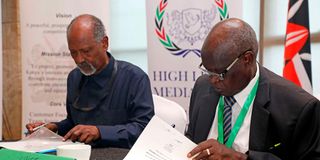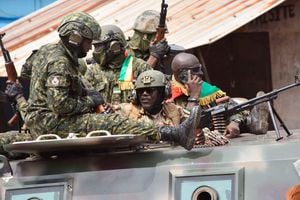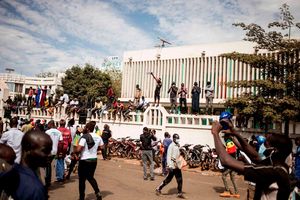
Igad Special Envoy for South Sudan Dr Ismail Wais (L) with South Sudan Chief Mediator Lazarus Sumbeiywo during the signing of a declaration of commitment to the Tumaini (Hope) initiative for the South Sudan peace process at Ole Sereni Hotel in Nairobi, Kenya on May 16, 2024.
South Sudan’s negotiating groups under mediated talks in Nairobi could reach a deal on drawing up the country’s new constitution, seeing it as the ‘social contract’ Juba needs to end perennial conflict.
That possibility emerged this week as more than a dozen hold-out groups continue to hold talks with South Sudan government representatives on the future the country they want in peace.
There are no timelines on when the actual drafting could begin yet, but The EastAfrican has learnt the talks in Nairobi has mostly admitted supreme laws will be needed before conducting elections, and to avoid such elections falling into dispute and relapsing the country back into chaos. Such an admission, the sources indicated, may also fuel negotiators on the urgency of having the laws drafted.
“In South Sudan, the systems do not exist yet to run elections. These talks have succeeded on a number of things and we expect a roadmap on how to work on a new constitution,” a source in the mediation talks, known as Tumaini Initiative, told The EastAfrican.
“The problem with South Sudan is that there is no social contract. There have been no elections since 2011 and current laws put power in one person. That is why the thrust of these talks is constitution making and preparing for elections.”
After initial suspicions, the Tumaini Initiative got more hold-out groups into the fold. Even Thomas Cirillo, a former deputy military chief now heading the National Salvation Front agreed to send observers, despite initially refusing to participate. Paul Malong, a former army chief, who heads the South Sudan United Front and who had initially been reluctant for talks also joined and has even initialled on some of the documents whose discussions are completed.
These groups are called so because they stayed out of the 2018 peace agreement between President Salva Kiir and other armed groups.
The deal, mediated by the Intergovernmental Authority on Development (Igad) is formally known as the Revitalised Agreement on the Resolution of Conflict in South Sudan (R-ARCSS).
“We have accomplished almost everything based on the principle of inclusivity. We went over and beyond to reach out to all groups. A permanent constitution is priority to Tumaini, but we are complementing existing institutions,” the source indicated, insisting writing the constitution will be the joint task of the government and South Sudanese stakeholders.
Already, the Tumaini Initiative has completed negotiations on nine protocols, most of which seek to address perennial conflicts but also reestablish stable institutions to protect everyone.
As at this week, the Protocol on Constitution making process, Protocol on Justice and Protocol on Economic Recovery have all been completed but stakeholders were yet to initial on the text. In negotiations, initialling text signals end to further debate on the contents of that text, allowing the mediation to move to the next stage of formal signing and implementation.
The groups have initialled on protocols touching on humanitarian access and support, trust and confidence building including end to arbitrary arrests of the dissent, permanent security arrangements and ceasefire, communal conflicts and guarantors.
One of the protocols says, “that the parties and stakeholders, as a gesture of their commitment to the Tumaini Initiative, create a conducive atmosphere for the implementation of the Tumaini Consensus and R-ARCSS that will lead to the adoption of a Permanent Constitution. For the Republic of South Sudan.”
The choice of a new constitution before elections was already popular long before the protocols were agreed on, among various stakeholders who gathered in Nairobi under the mediation of Lt-Gen (Rtd) Lazarus Sumbeiywo three months ago.
In June, some of South Sudan’s opposition and civil society groups issued a statement calling for a new constitution so the country can start from a clean slate.
Pagan Amum, a former minister in South Sudan, and leader of the South Sudan Opposition Movement Alliance (SSOMA) presented a four-point demand that included “constitutional conference” at the end of talks.
“The expected outcome of the conference will be (1) the adoption of a new social contract, (2) a constitutional text, (3) interim governance arrangements with a rescue programme and (4) implementation modalities,” said a joint statement which was signed by other opposition groups and PCCA (People’s Coalition for Civil Action), which represents civic movements.
“We strongly appeal to the region, the continent, and the international community to support the people of South Sudan in their search for peace and transition to stability and democracy.”
When they came in Nairobi, the hold-out groups and other stakeholders were united on the fact that they had been left out of the 2018 peace deal. But they had never agreed on how to present alternative ideas. Some chose arms. Others chose civic protests. Both were met with a heavy hand of government operatives, raising criticism from rights watchdogs.
Yet the government of President Salva Kiir, formally known as the Transitional Government of National Unity (TGNU) had argued for general election as a starter rallied for preparations.
From last week, however, reality started dawning on Juba that they may have to extend the TGNU for another time to be ready for elections.
After poring over the report of the High-Level Committee on the Implementation of the Peace Agreement and the Status of the Implementation of the Roadmap, the presidency in Juba was faced with two options: going into elections on December 22 or extending by another two years.
Martin Elia Lomuro, South Sudan’s Minister on Presidential Affairs said the extension was likely because of the critical provisions that were still outstanding. But he did say the final decision will be based on what the TGNU leadership agrees.
In August 2022, the parties agreed to a 24-month extension because some key articles of the 2018 peace agreement—officially known as the Revitalised Agreement on the Resolution of the Conflict in South Sudan (R-ARCSS)—such as security sector reforms had not been implemented.
The TGNU itself hasn’t been united on this issue however, and some members of the government including First Vice-President Riek Machar have criticised Tumaini for what they call including provisions that contradict the 2018 peace agreement. Some government officials also pushed for elections, arguing there was no vacuum in laws and that only an elected government should lead drafting of a new constitution. They cite the 2011 referendum, for example, which was held without a permanent constitution.
In Nairobi, sources said it would take at least 18 months to draft a constitution and another six months to promulgate it, aligning with the 24 months mooted in Juba.
The Reconstituted Joint Monitoring and Evaluation Commission (RJMEC) also weighed in at a briefing to the United Nations Security Council in New York that a realistic timetable for elections must be accompanied by a budget and guaranteed funding.
“Despite the extension of the Transitional Period by 24 months, key tasks such as completion of the unification of forces, making of the permanent constitution, and various elections-related preparatory tasks are still outstanding,” the chairperson of RJMEC, Gen Charles Gituai told the Security Council.
In spite of not being in active conflict, South Sudan’s ethnic clashes, coupled with refugees from Sudan have raised the humanitarian crisis, both of which politically hurt any plans to run elections. This year, at least 1000 people have been killed in ethnic clashes, according to UN estimates.
Linda Thomas-Greenfield, the US Ambassador to the UN said at the Council that South Sudan’s electoral calendar was already overdue. But she did say there must be dialogue on how to end the problem.
“It is long past time the people of South Sudan experience the peace, security, and freedom they have so long demanded, that they fought for, and they so deserve,” she said.
“And so, it is critical South Sudan’s leaders and parties engage in urgent dialogue, and bring this transitional period, started in 2011, finally to an end through peaceful and legitimate elections.”
The US has backed Kenya-mediated talks in Nairobi but warned South Sudan’s free and fair elections must begin by “allowing all to meaningfully take part in democracy.”
Additional reporting by Fred Oluoch







